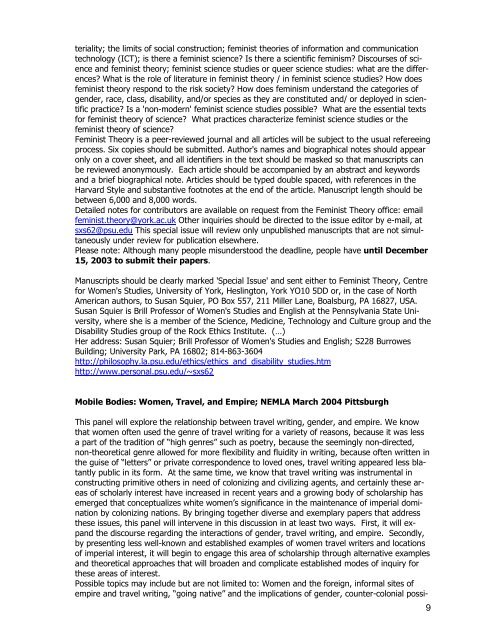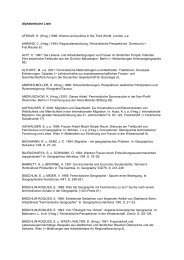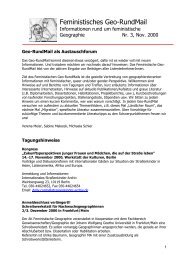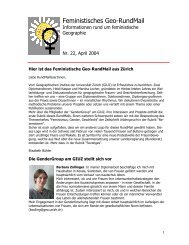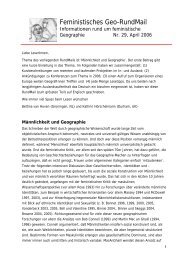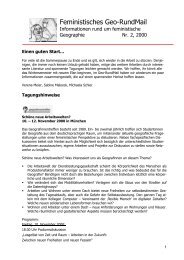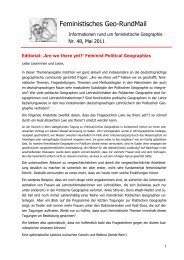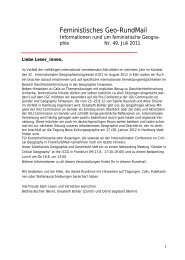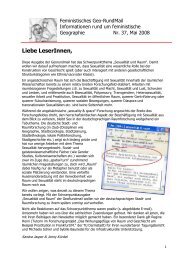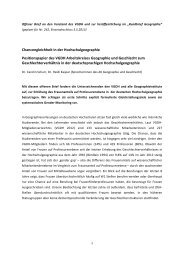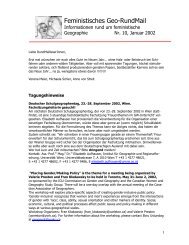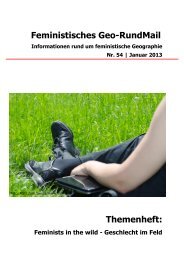Feministisches Geo-RundMail - AK Geographie und Geschlecht
Feministisches Geo-RundMail - AK Geographie und Geschlecht
Feministisches Geo-RundMail - AK Geographie und Geschlecht
Sie wollen auch ein ePaper? Erhöhen Sie die Reichweite Ihrer Titel.
YUMPU macht aus Druck-PDFs automatisch weboptimierte ePaper, die Google liebt.
teriality; the limits of social construction; feminist theories of information and communication<br />
technology (ICT); is there a feminist science? Is there a scientific feminism? Discourses of science<br />
and feminist theory; feminist science studies or queer science studies: what are the differences?<br />
What is the role of literature in feminist theory / in feminist science studies? How does<br />
feminist theory respond to the risk society? How does feminism <strong>und</strong>erstand the categories of<br />
gender, race, class, disability, and/or species as they are constituted and/ or deployed in scientific<br />
practice? Is a 'non-modern' feminist science studies possible? What are the essential texts<br />
for feminist theory of science? What practices characterize feminist science studies or the<br />
feminist theory of science?<br />
Feminist Theory is a peer-reviewed journal and all articles will be subject to the usual refereeing<br />
process. Six copies should be submitted. Author's names and biographical notes should appear<br />
only on a cover sheet, and all identifiers in the text should be masked so that manuscripts can<br />
be reviewed anonymously. Each article should be accompanied by an abstract and keywords<br />
and a brief biographical note. Articles should be typed double spaced, with references in the<br />
Harvard Style and substantive footnotes at the end of the article. Manuscript length should be<br />
between 6,000 and 8,000 words.<br />
Detailed notes for contributors are available on request from the Feminist Theory office: email<br />
feminist.theory@york.ac.uk Other inquiries should be directed to the issue editor by e-mail, at<br />
sxs62@psu.edu This special issue will review only unpublished manuscripts that are not simultaneously<br />
<strong>und</strong>er review for publication elsewhere.<br />
Please note: Although many people mis<strong>und</strong>erstood the deadline, people have until December<br />
15, 2003 to submit their papers.<br />
Manuscripts should be clearly marked 'Special Issue' and sent either to Feminist Theory, Centre<br />
for Women's Studies, University of York, Heslington, York YO10 5DD or, in the case of North<br />
American authors, to Susan Squier, PO Box 557, 211 Miller Lane, Boalsburg, PA 16827, USA.<br />
Susan Squier is Brill Professor of Women's Studies and English at the Pennsylvania State University,<br />
where she is a member of the Science, Medicine, Technology and Culture group and the<br />
Disability Studies group of the Rock Ethics Institute. (…)<br />
Her address: Susan Squier; Brill Professor of Women's Studies and English; S228 Burrowes<br />
Building; University Park, PA 16802; 814-863-3604<br />
http://philosophy.la.psu.edu/ethics/ethics_and_disability_studies.htm<br />
http://www.personal.psu.edu/~sxs62<br />
Mobile Bodies: Women, Travel, and Empire; NEMLA March 2004 Pittsburgh<br />
This panel will explore the relationship between travel writing, gender, and empire. We know<br />
that women often used the genre of travel writing for a variety of reasons, because it was less<br />
a part of the tradition of “high genres” such as poetry, because the seemingly non-directed,<br />
non-theoretical genre allowed for more flexibility and fluidity in writing, because often written in<br />
the guise of “letters” or private correspondence to loved ones, travel writing appeared less blatantly<br />
public in its form. At the same time, we know that travel writing was instrumental in<br />
constructing primitive others in need of colonizing and civilizing agents, and certainly these areas<br />
of scholarly interest have increased in recent years and a growing body of scholarship has<br />
emerged that conceptualizes white women’s significance in the maintenance of imperial domination<br />
by colonizing nations. By bringing together diverse and exemplary papers that address<br />
these issues, this panel will intervene in this discussion in at least two ways. First, it will expand<br />
the discourse regarding the interactions of gender, travel writing, and empire. Secondly,<br />
by presenting less well-known and established examples of women travel writers and locations<br />
of imperial interest, it will begin to engage this area of scholarship through alternative examples<br />
and theoretical approaches that will broaden and complicate established modes of inquiry for<br />
these areas of interest.<br />
Possible topics may include but are not limited to: Women and the foreign, informal sites of<br />
empire and travel writing, “going native” and the implications of gender, counter-colonial possi-<br />
9


